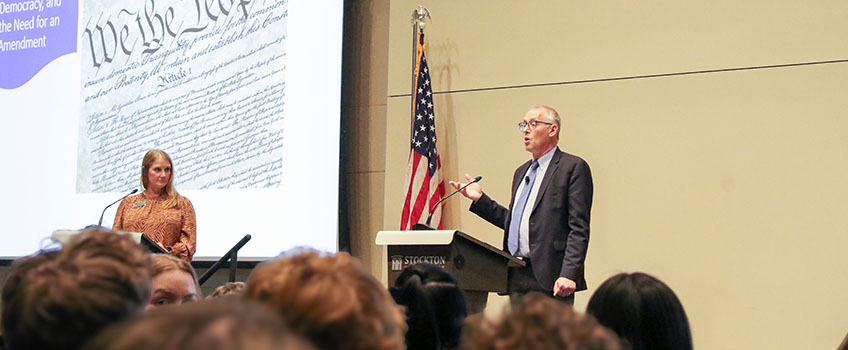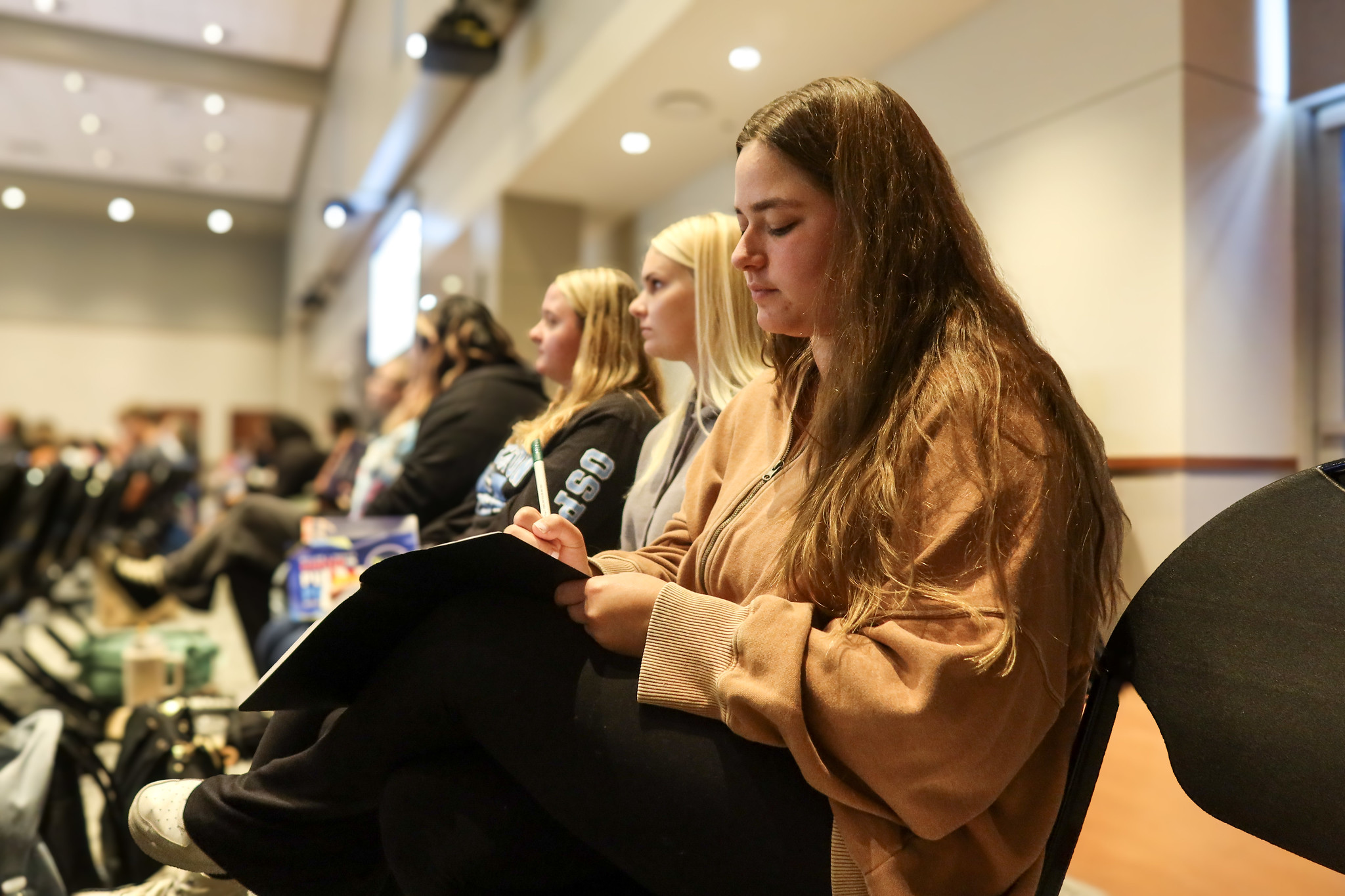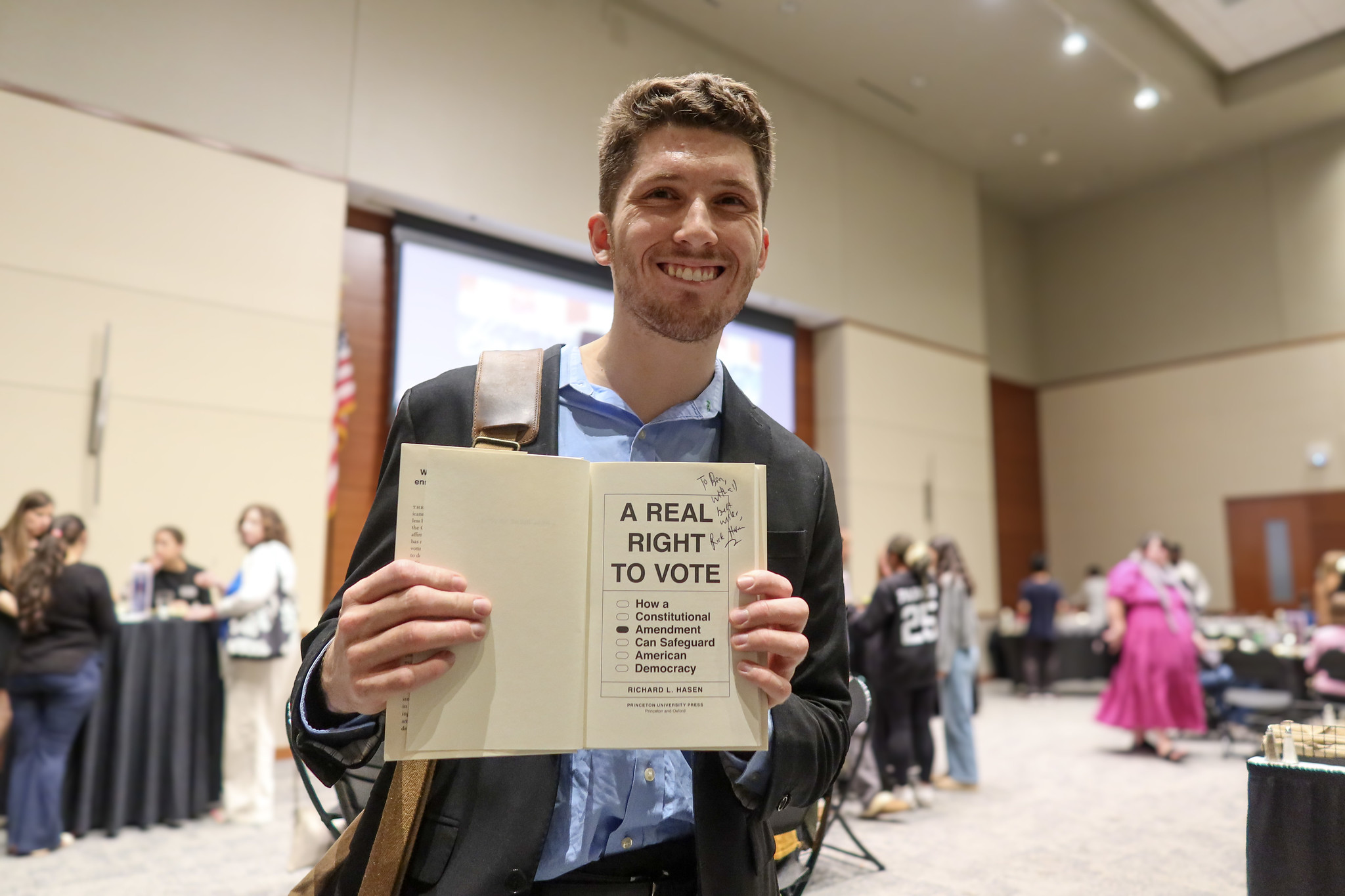Constitution Day Speaker Explores Voting Rights

Election law expert Richard L. Hasen was the featured speaker at the the 19th annual Constitution Day lecture Sept.24, discussing voting rights and the Constitution.
Galloway, N.J. — The United States Constitution does not guarantee individuals the right to vote. That came as a surprise to the crowd at the 19th annual Constitution Day lecture Tuesday in the Campus Center Event Room.
Holding one of the pocket copies of the U.S. Constitution distributed to all attendees, election law expert Richard L. Hasen challenged anyone to show him where the Constitution gives Americans voting rights.
“Where we live tells us a big part of how protected our right to vote is. There is no affirmative right to vote in the Constitution,” Hasen said, noting America’s founders made voting a states’ right.
 Hasen delivered the annual keynote address based on his book “A Real Right to Vote:
How a Constitutional Amendment Can Safeguard American Democracy.” Hasen is the Gary
T. Schwartz Endowed Chair in Law, Professor of Political Science, and Director of
the Safeguarding Democracy Project at UCLA School of Law. He also writes the Election Law Blog, which tracks current developments in voting rights and access around the country.
Hasen delivered the annual keynote address based on his book “A Real Right to Vote:
How a Constitutional Amendment Can Safeguard American Democracy.” Hasen is the Gary
T. Schwartz Endowed Chair in Law, Professor of Political Science, and Director of
the Safeguarding Democracy Project at UCLA School of Law. He also writes the Election Law Blog, which tracks current developments in voting rights and access around the country.
“As an institution of higher education, it is our responsibility to provide the setting for democratic participation; to offer opportunities for our students and our community to converse with those with differing viewpoints and life experiences,” Stockton President Joe Bertolino said in introducing Hasen. “The Stockton community is one that values inclusivity, providing an environment where all voices can be heard.”
Throughout his lecture, Hasen examined the U.S. Constitution, its lack of an affirmative right to vote, and how this absence of affirmation leaves American democracy vulnerable and negatively impacts every citizen.
We should not revere the Constitution as a dead document that can never be changed. We should instead ask how can this this document be improved so that all Americans’ lives can be better?Richard L. Hasen
“The Supreme Court said voting is not a right, it is something states decide whether you have or not. Missouri said no to women,” Hasen said.
Decades later, the 19th Amendment passed in 1920 prevented voting discrimination based on sex, but it still did not guarantee the right to vote. Instead, some states required property ownership or imposed other barriers to vote.
In 1903, the Supreme Court again bolstered states’ rights when ruling it was up to the state to enforce the Constitution – or not – when Jackson Giles, a Black man in Alabama, argued the 15th Amendment approved in 1870 prevented voting discrimination based on race.
“There were eight good years in the 235 years of Supreme Court for voting rights,” Hasen said, highlighting the 1960s when the court was led by Chief Justice Earl Warren. During that time, the court expanded voting rights for active miliary members to vote in the state they were stationed and reinforced the 14th Amendment provides equal protection of voting rights.
“If our voting rights depend on these cases being upheld by Supreme Court, I don’t think they will do it,” because the court’s view on upholding past interpretation of the Constitution is evolving, Hasen said.
 “We have a problem in this country, not everywhere, and not for everyone. Political
equality is the primary reason to enshrine the right to vote in the Constitution,”
he said, noting residents of Puerto Rico, Guam, the Virgin Islands and other U.S.
territories can’t vote, and state law is inconsistent in voting rights for convicted
felons. He said an affirmative right would also prevent the barriers some states put
in place, including voter ID laws, excess paperwork and documentation.
“We have a problem in this country, not everywhere, and not for everyone. Political
equality is the primary reason to enshrine the right to vote in the Constitution,”
he said, noting residents of Puerto Rico, Guam, the Virgin Islands and other U.S.
territories can’t vote, and state law is inconsistent in voting rights for convicted
felons. He said an affirmative right would also prevent the barriers some states put
in place, including voter ID laws, excess paperwork and documentation.
Hasen has been tracking election litigation since 1996 and discovered it has nearly tripled since 2000 and hit a record in 2020.
“The 2000 election taught people in a very close election the rules matter. So, people started changing the rules. Then people started to sue,” Hasen said. “The result of fighting over the 2000 election has been new restrictions on the right to vote, and the courts have not provided adequate protection.”
He said the following Constitutional amendments all expand voter rights, but they are not enough:
- 15th Amendment prevents voter discrimination on the basis of race
- 19th Amendment prevents voter discrimination on the basis of sex
- 23rd Amendment gives District of Columbia residents presidential voting rights
- 24th Amendment bars poll taxes
- 26th Amendment prevents voter discrimination on the basis of age
Through his research, Hasen has developed a proposed amendment that would affirmatively allow all adult U.S. citizens the right vote that includes automatic voter registration and national voter IDs. The amendment would require equal and nonburdensome voting opportunities and protection of minority voting rights.
“We think about the Constitution as a sacred document, like the Bible, like a religious text that we can’t mess with. The Constitution was written so that it could be amended,” Hasen said. “We should not revere the Constitution as a dead document that can never be changed. We should instead ask how can this this document be improved so that all Americans’ lives can be better?”
Hasen ended his lecture asking the audience to not get discouraged. “Don’t retreat into cynicism. Ask how we can organize to make our future better and improve our lives” he said.
Associate Professor of Political Science Claire Abernathy, who co-chairs the Constitution Day Committee with Associate Professors Lauren Balasco and Tina Zappile, reminded all students in the audience to register to vote.
“Since 2006, Stockton has commemorated Constitution Day and discussed the most pressing constitutional issues we face today,” she said. “Be ready to be a voter this fall.”
Constitution Day commemorates the Sept. 17, 1787, signing of the Constitution in Independence Hall in Philadelphia. Stockton’s event is sponsored by the William J. Hughes Center for Public Policy, the American Democracy Project at Stockton, the Stockton University Foundation, University Advancement and the Office of the Provost.
--Story by Stacey Clapp
--Photos by Lizzie Nealis


